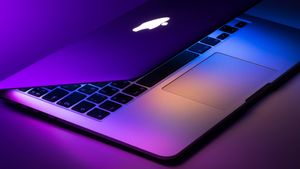Phew. 2021 was quite the year.
Last year about this time, I predicted what might be ahead for all of us in 2021. I think it’s safe to say that 2021 was a doozy, with unexpected challenges.
Some of those challenges — such as variants of COVID-19 keeping more people at home — pushed my predictions into high gear, such as the merging of the technology and the employee experience as well as the urgent need for Apple security solutions.
It’s always hard to say what is coming in the year ahead; I don’t have a crystal ball. But I have noticed some trends that I’m pretty sure will continue to build in 2022 and beyond.
The rise of Apple
I might as well just say it: this is the time for Apple in the enterprise. As of today, there are three things driving Apple. First, hybrid and remote work drives IT consumerization, which drives Apple. Second, the need to attract and retain talent from a younger workforce that leans heavily toward Apple. And lest we forget: this year Apple built the hottest laptops on the planet, powered by the M1 chip.
Looking ahead long-term, I truly believe by the end of this decade there will be more Apple devices used in businesses worldwide than Windows-based devices. In the United States, Apple momentum is even stronger— which is why I expect Apple Mac to overtake Windows market share in the enterprise by the time we reach the end of 2029.
And Jamf will be part of that transformation. Already, as of this last December, Jamf manages one million Mac computers powered by the M1 chip.
Hybrid work will redefine access
The rise of Apple also means the rise of simplicity. Apple users simply don’t have the patience of Windows users; they believe that things should just work.
And they should ‘just work’ wherever employees are located.
Increasing workplace flexibility
There are so many ways that people work, and the variety of where and how they work continues to diversify. People work from home, combine time at home and the office, use hoteling in a hybrid workspace— even rent space in coworking communities. In fact, a recent Accenture study on hybrid work found that 83% of 9,326 workers surveyed prefer a hybrid model that allows them to work remotely for at least 25% of the time. It also found that 63% of high-growth companies, including Jamf, already have work-from-anywhere models in place.
Enabling security and employee productivity
In this new reality fast, secure access has to become an enterprise baseline.
With hackers finding more and more access points in the weakest parts of companies' networks, security must be top-of-mind for organizations in 2022. According to a 2021 study by IBM, data breaches hit an all-time high last year, and bad actors have increasingly been gaining access through remote work locations. The most common root cause of data breaches? Stolen user credentials.
But there is good news: companies studied that adopted a zero-trust security approach were better positioned to deal with data breaches, and those that automated their security systems using AI and analytics to continuously validate connections fared even better.
That’s why I believe that In the next few years, traditional VPNs will come to an end. They aren’t dynamic enough. They don’t perform well enough. They aren’t private enough. Zero Trust Network Access (ZTNA) — a dynamic way of securing all transactions without the user having to think about it — is the right answer. Due to the inherent lack of flexibility and control in VPNs versus the flexibility of ZTNA as outlined by Network World, more and more companies will be modernizing and securing their employee access with ZTNA in the coming year.
Privacy vs. security
In the midst of increased security concerns for companies, there is also a deepening concern over employee privacy. Apple, cheered on by privacy advocates, has transformed the way advertisers do business by digging in on the idea that being tracked by a business is a violation of privacy.
Being tracked by advertisers is bad enough, but what about being tracked by your employer? That’s even worse.
In the increasing availability of popular bring your own device (BYOD) and employee choice programs in the modern workplace, employees would do well to keep an eye out. In many organizations, the IT department knows where employees are at all times, knows what websites they have visited and knows what apps their employees have installed.
While securing companies from attack, data breaches or corporate espionage is of utmost importance— it simply cannot come at the price of privacy loss.
Organizations should consider privacy even for those using company-provided devices. What is the right level of monitoring? Portugal just passed a law making it illegal for companies to call employees outside of work hours. Do they know that their employees' activities on work devices can be tracked outside of work hours? I wonder. What would they do if they did? Is that level of tracking ethical during employees’ off hours?
Those organizations that use Apple devices will already have a head start. Apple devices default to manage work and personal data separately, without segmenting the user experience.
In 2022, new solutions will emerge for both BYOD and corporate devices that address the complexity of hybrid work life, private life and additional security threats. Those that can keep it simple for their employees will fare best.
Education industry trends
This has been a very difficult few years for educators. And there are only more complex demands on teachers ahead, many of whom have hit their limit.
Access to remote or device-based learning
When the pandemic first hit in the 2019-2020 school year, districts scrambled to offer remote learning — to mixed results. Many school districts were unprepared, and many teachers had few tools and little training.
iPads in the classroom
Schools and districts that already had 1-to-1 iPad programs fared far better. I don’t need clairvoyance to see that districts with the means and organization will increase adoptions of 1-to-1 iPad programs in the coming year!
Because remote learning will change school forever.
When I was young, every year we had days when school was canceled. In Minnesota, it was usually because of weather. But there are other reasons: health, safety, or facilities issues.
Going forward, this will change. There will be "in-person school days" and "remote days." Sorry kids, no more snow days!
Inclusion and security
Because schools had to move very quickly when the pandemic hit, those with at-home infrastructures in place will now need to work in two difficult areas: first, they must ensure that the devices are properly used at school and at home, with strong filtering and security solutions. Second: administrators must arm educators for teaching in the classroom while at the same time including students who are staying home due to quarantine, hybrid school models or parent choice.
And solutions will need to rise up to help schools meet these new challenges.
Administrators will need to do some heavy lifting with robust, secure device management created specifically for schools. And they’ll need to keep this complex and ever-changing classroom reality as simple as possible for teachers.
We’re in this together.
We’re facing some very real challenges in 2022, but rising to meet those challenges will help to bring us all closer to increased productivity, safety and balance. We all have the opportunity to show the world how technology can enhance and simplify our lives, our work and the balance between them.
by Category:
Have market trends, Apple updates and Jamf news delivered directly to your inbox.
To learn more about how we collect, use, disclose, transfer, and store your information, please visit our Privacy Policy.




